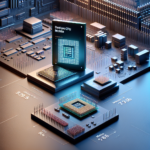The Impact of CPU on Game Physics and AI

The Impact of CPU on Game Physics and AI
In the realm of video gaming, the Central Processing Unit (CPU) plays a pivotal role in determining the overall performance and experience. While the Graphics Processing Unit (GPU) often steals the spotlight for its role in rendering stunning visuals, the CPU is the unsung hero that handles the intricate calculations required for game physics and artificial intelligence (AI). This article delves into the impact of the CPU on game physics and AI, exploring how it shapes the gaming experience and what advancements are on the horizon.
Understanding the Role of the CPU in Gaming
What is a CPU?
The Central Processing Unit (CPU) is the brain of a computer, responsible for executing instructions from programs. It performs a wide range of tasks, from basic arithmetic to complex decision-making processes. In gaming, the CPU is crucial for handling non-graphical computations, such as game logic, physics calculations, and AI behavior.
CPU vs. GPU: A Brief Comparison
While the GPU is specialized for rendering images and handling parallel tasks, the CPU excels in sequential processing and complex calculations. Both components are essential for a balanced gaming experience, but they serve different purposes. The GPU handles the visual elements, while the CPU manages the underlying mechanics that make the game world function smoothly.
The Impact of CPU on Game Physics
What is Game Physics?
Game physics refers to the simulation of physical systems within a game. This includes the movement of objects, collision detection, and the behavior of materials under various forces. Accurate physics simulations are crucial for creating immersive and realistic gaming experiences.
CPU’s Role in Physics Calculations
The CPU is responsible for performing the complex mathematical calculations required for game physics. These calculations include:
- Collision Detection: Determining when and where objects in the game world collide.
- Rigid Body Dynamics: Simulating the movement and interaction of solid objects.
- Soft Body Dynamics: Simulating the behavior of deformable objects, such as cloth or jelly.
- Fluid Dynamics: Simulating the flow of liquids and gases.
These calculations are computationally intensive and require a powerful CPU to ensure smooth and accurate simulations. A weak CPU can lead to inaccurate physics, resulting in unrealistic or glitchy behavior in the game world.
Examples of Physics-Intensive Games
Several games are known for their advanced physics simulations, which rely heavily on the CPU. Some notable examples include:
- Half-Life 2: Known for its groundbreaking use of physics-based puzzles and interactions.
- Red Dead Redemption 2: Features realistic physics for character movement, animal behavior, and environmental interactions.
- Kerbal Space Program: Simulates realistic orbital mechanics and spacecraft physics.
The Impact of CPU on Game AI
What is Game AI?
Game AI refers to the algorithms and techniques used to create intelligent behavior in non-player characters (NPCs). This includes pathfinding, decision-making, and adaptive behavior. Effective AI is essential for creating challenging and engaging gameplay experiences.
CPU’s Role in AI Calculations
The CPU is responsible for executing the algorithms that drive game AI. These algorithms can be highly complex and require significant computational power. Key AI tasks handled by the CPU include:
- Pathfinding: Determining the optimal route for NPCs to navigate the game world.
- Decision-Making: Enabling NPCs to make choices based on the game state and player actions.
- Behavior Trees: Structuring NPC behavior in a hierarchical manner to create more realistic actions.
- Machine Learning: Implementing adaptive AI that learns and evolves based on player interactions.
A powerful CPU is essential for running these algorithms efficiently, ensuring that NPCs behave intelligently and respond appropriately to the player’s actions. A weak CPU can result in sluggish or predictable AI, diminishing the overall gaming experience.
Examples of AI-Intensive Games
Several games are renowned for their advanced AI systems, which rely heavily on the CPU. Some notable examples include:
- The Last of Us Part II: Features highly adaptive and realistic enemy AI that responds to player actions.
- Civilization VI: Utilizes complex AI algorithms to simulate the behavior of rival civilizations.
- Alien: Isolation: Known for its unpredictable and intelligent alien AI that hunts the player.
Optimizing CPU Performance for Gaming
Choosing the Right CPU
When selecting a CPU for gaming, it’s essential to consider factors such as clock speed, core count, and cache size. High-end CPUs with multiple cores and high clock speeds are better suited for handling the demands of modern games. Some popular choices among gamers include:
- Intel Core i9: Known for its high performance and multi-threading capabilities.
- AMD Ryzen 9: Offers excellent performance and value for money, with a high core count.
Overclocking
Overclocking is the process of increasing the clock speed of a CPU beyond its factory settings. This can provide a significant performance boost, but it also comes with risks such as increased heat output and potential instability. Proper cooling solutions and careful monitoring are essential when overclocking a CPU.
Optimizing Game Settings
Many games offer settings that allow players to balance performance and visual quality. Reducing settings such as physics detail, AI complexity, and draw distance can alleviate the strain on the CPU, resulting in smoother gameplay. It’s essential to find the right balance that suits your hardware and personal preferences.
Future Trends in CPU Technology
Advancements in Multi-Core Processing
Modern CPUs are increasingly focusing on multi-core processing, allowing for parallel execution of tasks. This trend is particularly beneficial for gaming, as it enables more efficient handling of physics and AI calculations. Future CPUs are expected to feature even higher core counts and improved multi-threading capabilities.
Integration of AI Accelerators
Some modern CPUs are beginning to integrate AI accelerators, specialized hardware designed to handle AI computations more efficiently. This integration can offload some of the AI processing from the main CPU cores, resulting in improved performance and more sophisticated AI behavior in games.
Quantum Computing
While still in its infancy, quantum computing holds the potential to revolutionize gaming by providing unprecedented computational power. Quantum processors could handle complex physics simulations and AI algorithms with ease, enabling entirely new levels of realism and interactivity in games.
FAQ
How does the CPU affect game performance?
The CPU affects game performance by handling non-graphical computations such as game logic, physics calculations, and AI behavior. A powerful CPU ensures smooth and accurate simulations, intelligent NPC behavior, and overall responsiveness in the game.
Can a weak CPU bottleneck a powerful GPU?
Yes, a weak CPU can bottleneck a powerful GPU. If the CPU cannot keep up with the demands of the game, it can limit the performance of the GPU, resulting in lower frame rates and reduced overall performance.
Is it better to have more CPU cores or higher clock speed for gaming?
Both core count and clock speed are important for gaming. Modern games benefit from multiple cores for parallel processing, but high clock speeds are also crucial for single-threaded performance. Ideally, a balance of both is recommended for optimal gaming performance.
How can I optimize my CPU for gaming?
You can optimize your CPU for gaming by choosing a high-performance CPU, overclocking (if safe and feasible), and adjusting game settings to balance performance and visual quality. Ensuring proper cooling and keeping your system free of unnecessary background processes can also help.
What future advancements in CPU technology should gamers look forward to?
Gamers can look forward to advancements in multi-core processing, integration of AI accelerators, and the potential of quantum computing. These developments promise to enhance the performance and capabilities of CPUs, leading to more immersive and realistic gaming experiences.
Conclusion
The CPU plays a crucial role in shaping the gaming experience by handling the complex calculations required for game physics and AI. A powerful CPU ensures accurate physics simulations, intelligent NPC behavior, and overall responsiveness in games. As technology continues to advance, we can expect even more sophisticated and immersive gaming experiences driven by cutting-edge CPU innovations. Whether you’re a casual gamer or a hardcore enthusiast, understanding the impact of the CPU on game physics and AI is essential for optimizing your gaming setup and enjoying the best possible performance.




